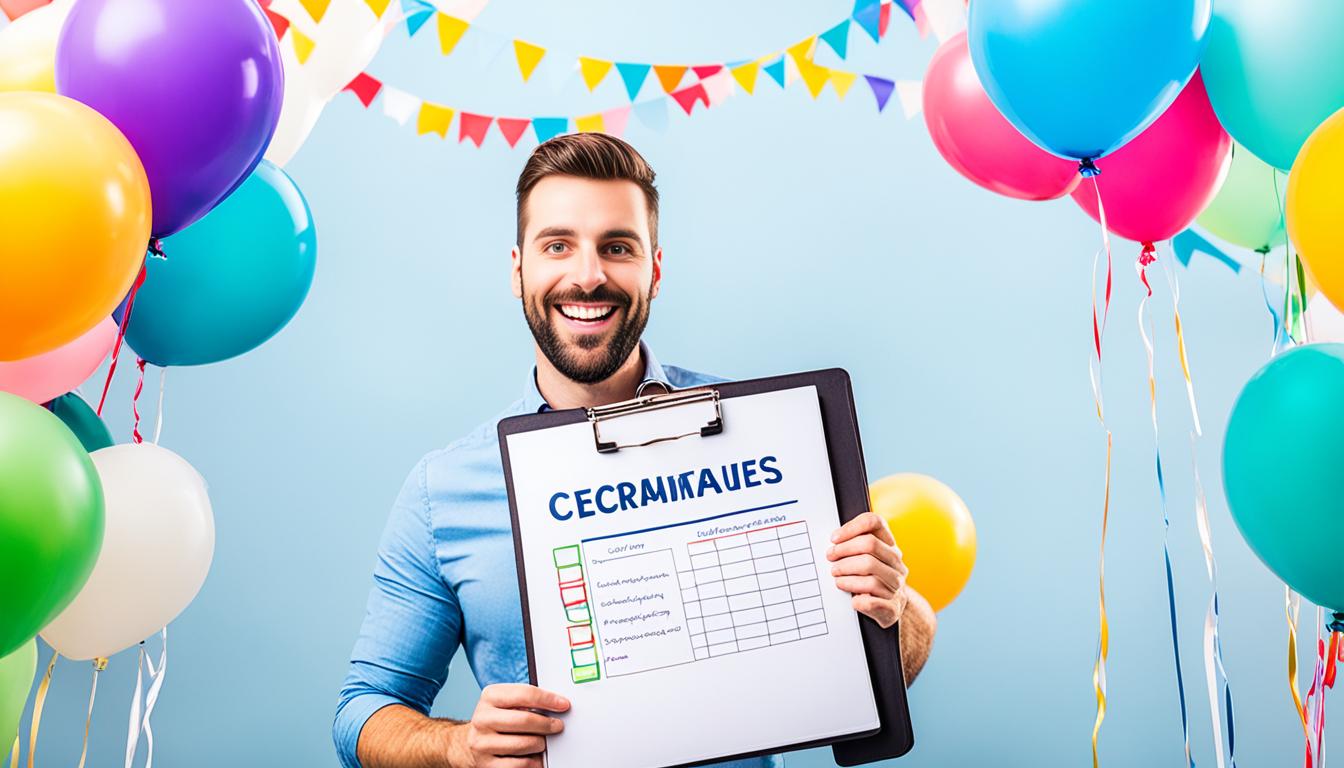Introduction to Event Planning Essentials
Planning an event is both exciting and tough. It could be a small party or a big conference. You have many things to think about and do. Knowing the event planning basics is key to making any event great and memorable.
Imagine you love planning events. Your friend Sarah asks for your help with her wedding. She wants everything to be perfect. You jump in to make her dream wedding come true.
You start by looking up tips and guides for event planning. You may even take some courses to get better. You learn how to plan from start to finish. A key thing you find out is making a detailed checklist is super important.
With new skills and knowledge, you and Sarah talk about her wedding. You figure out what’s important like the venue and the guest list. This will help you plan better.
Now, you see how having a good plan is crucial. It helps you know what to do at each step. Your plan should have goals, who does what, the budget, venue choice, and even how the event will look and feel.
While planning, you face some challenges. But you don’t give up. Using software and your detailed checklist keeps you on track. This way, you make sure nothing important is forgotten.
On the big day, Sarah’s wedding is perfect. She looks happy and the guests have a great time. Everything you planned comes together beautifully.
Your hard work and careful planning paid off. The smile on Sarah’s face shows it was all worth it. You’re happy because she’s happy.
Now that you know the basics, let’s learn more about event planning. We’ll explore the must-know parts and steps for successful events.
Key Takeaways:
- Event planning is a challenge but also quite fulfilling. It needs a sharp eye for detail and great organizational skills.
- An event plan is like a map, guiding you from the start to the success of the event.
- Using event planning tools and checklists can make your job a lot easier.
- Good communication and working well with others are vital for a great event.
- Stay focused, ready to adjust, and keep your mind open during your planning journey.
Why You Need an Event Plan
An event plan is key for organizing every detail of your event. No matter the type of event, it helps keep everything in check. You need to set goals, assign roles, create a budget, pick a place, and plan how you’ll tell people about it. An event planning template makes this process smoother by offering a clear structure.
Creating this plan lets you carefully work out each step. This keeps you on track and organized from start to finish. The plan is your guide, leading you from your first ideas and research to making it all happen and checking how it went.
“An event plan is like a compass that helps you navigate through the complexities of event planning and ensures that you don’t lose track of your goals.” – Event Planning Expert
Setting clear goals is a big plus of having a plan. It helps focus everyone’s efforts, whether you want more people to show up, to make money, or to give attendees a great experience.
It’s also vital to assign roles and duties. This way, everyone knows what they’re supposed to do. It leads to a smoother, more collaborative team effort.
Benefits of Using an Event Planning Template
An event planning template makes things easier by providing a clear guide. It saves time and keeps everything in order as you plan.
- Structure: An event planning template covers all the major points you need for a good plan. It makes sure you remember every crucial detail and concentrate on what really matters for your event’s success.
- Efficiency: Using a template saves time since you’re not starting from zero. You just adjust the template to fit your event. This makes planning faster.
- Consistency: A template makes sure your plan is put together in a unified way. Everything fits and works well together.
In the end, having a solid event plan and using a template are crucial for a successful event. They offer a blueprint, keep you organized, and ensure all aspects are looked after. It doesn’t matter if you’ve done this a lot or it’s your first time. A good plan and template really help make your event a hit.
The Core Features of an Event Plan
A good event plan has key parts for a thriving event. It includes setting goals, knowing who does what, making a budget, picking the right place, giving the event its own look, and inviting special speakers or guests.
Event Goals and Objectives
It’s key to outline what you want from your event. Whether it’s to get the word out, boost sales, or bring people together, clear goals help you stay on track. They also let you know if your event was a success.
Individual Roles and Responsibilities
Giving everyone a job ensures things run smoothly. Each person knows exactly what to do. This makes sure nothing important gets missed and helps the team work well together.
Event Budget
Planning out your spending is very important. You need to think about all the costs like venues, food, and ads. By checking your spending as you go, you can make sure you don’t overspend.
Event Location
The spot you pick can make the event unforgettable. Look at things like how many people it fits, if it’s easy to get to, and the vibe. Visiting places and talking to staff can help you choose the best spot for your vision.
Event Branding
A strong look and feel for your event can make it stand out. Use a unique logo, colors, and a theme to create your event’s style. This makes people excited and helps them identify with your event.
Event Speakers and Special Guests
Getting well-known guests can make your event more appealing. Pick speakers or stars that match your event’s message. Their presence can make your event more respected and interesting.
By including these key elements in your plan, you set a strong base for your event. This approach helps ensure everything goes well and your event is a hit with both your goals and what your guests expect.
How to Plan a Successful Event in 13 Steps
Planning a successful event follows a clear plan. It’s all about covering crucial details well. Here are the 13 steps you need to take.
- Define Your Event Goals and Objectives: First, know what you want the event to achieve. Set clear, measurable goals that fit with your aims.
- Organize Your Team: Get a team of solid folks together to help plan and run the event. Make sure everyone knows their roles for smooth teamwork.
- Recruit and Train Volunteers: If you need extra hands, find and train volunteers. They should be excited about what your event stands for. Make sure they know their duties.
- Establish a Budget: Decide on a budget and split it among different needs like the venue, food, and ads. Keep an eye on spending as you go on to avoid surprises.
- Choose a Date: Pick a date that works for your attendees and won’t clash with other events. Check with key people to make sure they can make it.
- Create an Event Master Plan: Make a detailed plan for everything that needs to happen before and during the event. Tools or software can help you keep it all in line.
- Choose Event Software: Use special software to help with planning, sign-ups, and keeping in touch with guests. It makes everything run more smoothly.
- Book a Venue: Find a good spot that’s the right size, has what you need, and is affordable. Think about where it is, how to get there, and what it feels like.
- Brand Your Event: Come up with a look and feel that speaks to your event and its audience. Create a logo and keep all the event’s visuals consistent.
- Secure Speakers or Special Guests: Choose speakers or VIPs who will make your event stand out. Make sure they’re onboard and people know why they’re there.
- Execute a Strong Event Marketing Plan: Have a solid plan to spread the word about your event. Use social media, emails, and creating content to get your message out.
- Set Up Day-of Processes: Plan the details for the day, like how people will sign in, what signs you need, and how the event flows. Also, include fun things for guests to do.
- Conduct Evaluations and Post-Event Analysis: After, review feedback from those who came, sponsored the event, and others. Use what you learn to make your next event even better.
Follow these steps, and you’re on your way to a successful event. You can meet your goals and give your attendees an event to remember.
Event Budgeting Made Easier
Setting up an event budget is key to its success. A good budget helps you spend money wisely and keeps you from going over your limit. We’ll share tips on budgeting for items like the venue, food, activities, and more.
Understanding Event Costs and Estimation
To manage your event’s money well, you need to know all its costs. Think about everything, from the main ones like where it’ll be held and what people will eat, to the small things that quietly eat up money. Estimate each cost carefully to make a budget that fits the real world. Don’t forget to include registration, travel, and where everyone will sleep in your planning.
Pro Tip: It’s smart to guess high on costs rather than low. That way, you’ll have a safety net and avoid big money shocks.
Tracking Event Expenses
Keeping track of how you spend your event money is a must. If not, you might blow past your budget. Event management software can help by letting you record and sort expenses, manage payments, and see how you’re doing with clear reports. This way, you can make changes as you go to keep on track.
The Benefit of Event Sponsors
Sponsors can help a lot by covering some costs. Look for sponsors who fit your event’s vision. They could give you money or things you need like freebies to hand out. This way, you save money and give your guests more.
Remember, working on your budget is ongoing. Keep looking at your spending, find ways to spend less without hurting your event’s quality.
Venue Sourcing and Selection

Finding the right venue is key to your event’s success. Careful planning can help you choose a place that meets your goals. This way, your event will be truly memorable for everyone who comes.
Challenges in Venue Sourcing
Looking for a venue can be tricky. Each event has its unique needs and offerings, make it a challenge. Here are some issues you might face:
- Venue Availability: The best venues might already be booked, especially in busy times. Start looking early to get your top pick.
- Event Size and Type: Different events need different spaces. Whether it’s a big conference or a small wedding, find a venue that fits your needs.
- Event Duration: Make sure the venue can host your event for as long as you need. Some places have time limits, so check this out.
- Budgetary Considerations: Your venue choice will be influenced by your budget. Find a place that fits your financial plan without sacrificing your must-haves.
How to Find the Perfect Venue
Here are some steps to ensure you pick the perfect place:
- Define Your Requirements: Be clear about what you need for your event. Think about the type of event, its size, how long it will be, where you want it, and your budget.
- Utilize Venue Sourcing Technology: Use online tools to search for venues. They can make finding the right spot much easier by letting you filter according to your requirements.
- Consider Multiple Options: Don’t just look at one venue. Look at several to make sure you find the best one. Visit them in person or take virtual tours where you can.
- Review Venue Amenities and Services: Look into what each venue offers. Check if they have what you need for technology, food, parking, and if they’re accessible to everyone.
- Check References and Reviews: Always look at what others have said about the venue. This feedback can give you a good sense of their quality and how they treat their clients.
- Negotiate Contracts: If you’ve found the right place, talk about the contract terms. Make sure they meet your needs and be aware of any conditions, fees, or deadlines.
Stay Organized with Venue Selection
It can be hard to keep track of venues and their details. Spreadsheets or special software can help you stay on top of everything. They let you compare your options and keep all the important info in one place.
| Venue Option | Capacity | Location | Price |
|---|---|---|---|
| Venue A | 250 | Downtown | $5,000 |
| Venue B | 400 | Suburb | $7,500 |
| Venue C | 150 | City Center | $3,500 |
Being organized is key to making a smart choice. When you consider key factors and compare venues closely, you’re on your way to finding the perfect spot for your event.
Virtual Event Planning
Virtual events are becoming more popular. It’s important to know how to plan and host them well. This means using technology to make events that are fun and interactive. Here, you’ll learn about picking the best platforms, making checklists, and creating great content for online events.
Choosing the Right Virtual Event Platform
The first step in planning a virtual event is picking the right platform. It should make the experience smooth for everyone. Look for platforms with live streaming, chat rooms, and places for networking. Think about how big your event might get, how easy the platform is to use, and if it fits with your goals.
Spending time to test different platforms is smart. Find a platform that can help with technical issues, let you make it look like it’s yours, and shows you how the event is going.
Creating a Virtual Event Checklist
A checklist is key for organizing a virtual event. It makes sure you don’t forget important steps. Include things like what your event is about, who your audience is, and exciting activities you can do.
- Set clear event goals and objectives
- Define your target audience
- Design an engaging event schedule
- Select the right virtual event platform
- Secure high-quality content and speakers
- Promote your event through various marketing channels
- Create engaging and interactive activities for attendees
- Test all technical aspects before the event
- Develop a plan for post-event follow-up and engagement
A good checklist keeps you on track. It makes sure every part of your event is well planned and goes smoothly.
Adapting Content and Engagement Strategies for the Virtual Space
To make your virtual event unforgettable, you’ll need to be creative. Use features like live Q&As, polls, and games to keep people interested. Make sure your content is fresh and don’t make it too long.
It’s also important to give clear guidance on how to use the platform. This helps people enjoy the event. Fun and interactive content is key for a great event.
Maximize the Impact of Your Virtual Event
With smart planning, your virtual event can be amazing. Choose the best platform, have a detailed checklist, and be creative with the content. This will make sure you meet your goals and your guests love it.
Importance of Event Branding and Marketing
Event branding and marketing are key to a successful event. They draw in attendees and make the event unforgettable. By creating a strong brand and using smart marketing, you can make your event more visible and popular.
To start, you need to pick the right visuals for your event – logos, colors, and fonts. These should match your event’s theme and goals. This matching look will help your event stand out and stay in people’s minds.
Next, focus on making promotional stuff that grabs people’s interest. This includes brochures, posters, and stuff for digital and social media. Make sure they look great and clearly tell people what’s special about your event. Mention its big draws, like the speakers and fun things to do.
But, just looking good isn’t enough. You have to market your event well to really make a splash. Use different ways to tell people about your event and get them excited for it.
Places like social media are great for spreading the word. Post interesting updates and use event hashtags. Don’t forget about social media ads – they can help you target the right people.
Emails can also help you reach more attendees. Build a list and keep in touch with people. Send them updates and special offers. Personalize your emails to show you care and to build anticipation.
Don’t ignore old-school ads, like in newspapers or on the radio, alongside the digital stuff. Choose ads that will appeal to the people you want to come to your event. They can help get your event noticed even more.
Working with influencers, bloggers, and media outlets is another way to get extra buzz for your event. They already have followers who might be interested in your event. It’s like getting a personal recommendation from someone they trust.
To sum up, event branding and marketing are crucial for any event’s success. With a clear brand, great promo materials, and an effective marketing plan, you can draw in more people, get them excited, and make sure they remember the event fondly.
Key Takeaways
- Event branding is the process of developing a unique and memorable identity for your event.
- Effective event marketing involves utilizing various marketing tools, such as social media and email marketing, to promote your event.
- Creative and visually appealing promotional materials help grab the attention of potential attendees.
- Using social media and traditional advertising can significantly boost your event’s visibility.
- Working with influencers and media outlets can help broaden your event’s reach and attract a larger audience.
| Event Branding and Marketing Checklist |
|---|
| Develop a cohesive event brand identity |
| Create visually appealing promotional materials |
| Utilize social media platforms for event promotion |
| Implement an email marketing strategy |
| Explore traditional advertising methods |
| Collaborate with influencers and media outlets |
Conclusion
Event planning isn’t easy, but with the right guidance, success is within reach. This guide has all you need to plan your event well. By using these tips and the right technology, your event will be a hit.
Staying organized is key during planning. Talk often with your team and those involved. This ensures things run smoothly. Remember to check how your event goes and get feedback. This will help you improve for next time.
Good event planning is about focus and making smart choices. With the knowledge from this guide, you’re ready to make a big impact. So, go ahead and plan the perfect event. Your audience will love it. Happy planning!
FAQ
Q: What is event planning?
A: Event planning is all about making sure an event goes well. It involves many tasks like setting goals and creating a budget. You also pick a date and place, and plan how to tell people about it.
Q: Why is it important to have an event plan?
A: An event plan is a must to keep things running smoothly. It makes sure nothing important is forgotten. With a plan, everyone knows what they have to do, and the event comes together better.
Q: What are the core features of an event plan?
A: The key parts of an event plan are its goals, who does what, how much it’ll cost, and where and when it happens. You also figure out how the event will look and who will be there as guests. These parts are the backbone of your event’s success.
Q: What are the steps to plan a successful event?
A: Planning a great event means going through 13 important steps. This includes setting clear goals and involving the right people. You also need a budget, a venue, and a plan to get the word out. Making a detailed plan and ensuring everything runs smoothly on the big day is also crucial.
Q: How do I create an event budget?
A: Start by listing all the things your event will need, like the venue and food. Then, figure out how much each item will cost. Remember to keep track of your spending. Getting sponsors can also help you save money.
Q: How do I find the right venue for my event?
A: Choosing the best venue depends on the type of event, how many people will come, and your budget. Start looking for a place early to have more options. Using tech to search for venues and stay in touch with them helps a lot.
Q: How do I plan a virtual event?
A: For a virtual event, you’ll need to pick the right online platform. Create a checklist to keep everything organized. And make sure to update your content and ways to interact for the online world. This is key to a successful virtual event.
Q: How important is event branding and marketing?
A: Branding and marketing are key to getting people excited and making your event stand out. Designing a unique look and spreading the word in creative ways, like on social media, is vital. This is how you attract the audience you want.
Q: How can I ensure a successful event planning process?
A: To have a great event, follow a clear plan and use helpful tools. Stay on top of things by being well-organized and keeping in touch with your team. Always look back at what you’ve learned to make your next event even better.







